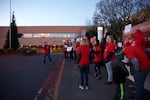
Ethan Frager (hoodie) is a ninth grader at Pioneer Special School in Southeast Portland. He joined a protest Dec. 5, 2017 against a plan to split up the school.
Rob Manning / OPB
Dozens of supporters of the Pioneer Special School program rallied Tuesday night against plans for the school.
Among the chants that demonstrators shouted was “Education is a right, Pioneer will fight, fight, fight!"
The plan presented last week by Superintendent Guadalupe Guerrero would relocate all 123 Pioneer students, children with disabilities, behavior problems and challenging backgrounds.
The move is largely to open up Pioneer's home, the Holladay site in Southeast Portland. Moving out Pioneer can make room for the ACCESS Academy, which is itself being displaced by larger plans for neighborhood schools in North and Northeast Portland.
The plan for Pioneer's students is still undergoing some revisions, but it generally aims to send Pioneer's younger students to the Applegate Elementary building in North Portland, bumping out a Head Start program there. Older students could go to Marshall High School in Southeast Portland, to individual placements through the Multnomah Education Service District, or to another centralized facility that the district may announce next week.
Among the protesters Tuesday night was Ethan Frager, a ninth grader at Pioneer. He said he's gotten the support he needed at a tough time, and he's planning to return to a traditional high school in January.
"I've had like a total turnaround. I don't think I would've had that if I hadn't been going here with the support that they have," Frager said.
Related: Oregon Graduation Rate Remains Near National Basement
But Frager said he expects his classmates to struggle through a forced transition next fall, under Guerrero's plan.
The head of Oregon's largest school district has now antagonized two very sensitive school communities in a very short time.
Guerrero said it wasn't his intention to immediately overhaul programs for gifted students and children with special needs when he took over the superintendent's job. But he arrived at a school district with a number of initiatives already underway that he had to carry forward.
At the same time, Guerrero faces a broader mission: to transform numerous aspects of Portland Public Schools while rebuilding trust with its parents, teachers and other communities. Transformation and trust are at the heart of the conflicts involving ACCESS Academy and the Pioneer school.
Pioneer is home for Anthony Purkapile. He didn't attend the rally. His older sister, Bethany, said it would've been too noisy for her sensitive little brother. And there's another reason.
"He doesn't even know [about the changes]," said Bethany Purkapile. "We're so afraid to tell him, because we don't know what kind of response we'll get."
Purkapile said her parents adopted Anthony as a baby from a mother with alcohol and drug problems. She said her brother didn't develop like other kids, and didn't fit at school.
"In the education system, Anthony was just left in a corner. He would come home and he would just… he would beat us. He would put us in the hospital, because he couldn't understand his anger and his emotions," said Bethany Purkapile.
She said Anthony's life changed at Pioneer. "Being at Pioneer, and working with teachers that understand that, and work with him with that, he's able to sustain life at home," she said.
Meanwhile, ACCESS parents have been advocating for a permanent home for years. But they didn't request the Holladay site, parent Mark Keller is quick to point out.
“A lot of people are up in arms at ACCESS. They feel like what the superintendent has done to Pioneer is similar to what he had proposed at ACCESS initially,” Keller said, referring to Guerrero’s proposal in October to close ACCESS and create a "pathways" program across multiple sites.

Staff and parents from Pioneer Special School protest outside the Portland Public Schools administration building, Dec. 5, 2017.
Rob Manning / OPB
ACCESS parents argued against that plan, and Guerrero shelved it several days later and apologized.
Guerrero arrived at a district dealing with lead in school drinking water and no contract with its teachers, all while the district was midway through school boundary changes.
"It's only been eight weeks – but it sure seems like a lot longer than that," Guerrero said, with a laugh, in an OPB interview.
Guerrero acknowledged what he calls "missteps," but he said the district needs to change.
"It's in dire need of transformation; and with that, the first stage is always a bit more dramatic because it's disruptive," Guerrero said.
Unlike Guerrero's reversal on ACCESS, the superintendent has not backed off plans to break up Pioneer. He contends the open floor plan and high ceilings at the Holladay building are not well suited for Pioneer because it's more room than the program needs. Guerrero argues Applegate and the other placements could be an improvement for Pioneer services.
Guerrero said what started as a search for a home for ACCESS turned into a re-evaluation of special education facilities and services.
"It's not that I was looking to open the special education Pandora's Box, the second month on the job," Guerrero said. Instead, he said he had to ensure that ACCESS had a building that would work for them, and he believes Holladay will.
"We have a group of students that’s been displaced, as a result of our excitement of starting two new comprehensive middle schools, and there wasn’t necessarily a solution for what happens with all the students who aren’t going to be in those buildings,” Guerrero said.
Veteran Pioneer teacher Dallas Dennis contends Pioneer has made innovative use of the Holladay site to serve the unique needs of their challenging students. They have emotional "blowouts," sometimes, he said, and Holladay can give them space.
At the Tuesday night rally at the district headquarters, Dennis doubted a plan from a leader so new to Portland.
“I’m not blaming anyone, but I don’t understand how a person can make a decision only being around for a few months,” Dennis said.
Related: Life And Death At Chemawa Indian School
Dennis called it a "hasty decision," and contended top administrators "rarely" visit to "know what goes on at Pioneer."
The questioning at the rally continued into the school board meeting inside Tuesday night. Guerrero's challenge is that building trust takes time, but the problems are urgent.
"In the absence of an articulated vision and strategic plan, these moves might seem idiosyncratic. People might be thinking, 'What's that new superintendent going to do next?' Well, stay tuned, right?," said Guerrero.
With some groups, Guerrero has a structure to talk through issues. He's in contract talks with teachers, and said they're going well. Teacher leaders agree – but are eager to see concrete offers to really be convinced.
Teachers aren't the only ones reluctant to give Guerrero the benefit of the doubt, given district scandals over environmental hazards and sexual abuse, and the sudden rollout of changes for two of the district's most challenging populations.
Some opponents of breaking up Pioneer admit to not being that familiar with Applegate or with other aspects of the plan, and they acknowledge that the Holladay facility has its limitations.
But the district's difficulty in handling past overhauls undermines confidence in future changes. Families emphasize what they know and trust: the teachers and other staff that work with the students.
Bethany Purkapile, the older sister of student Anthony, contrasts Pioneer with other government agencies that families confront in trying to get help for children with significant needs.
“Every time there’s a door closing in your face — ‘Sorry, we can’t help you, there’s nothing more we can do, there’s no other services we can provide.’ And Pioneer opens that door and says, ‘No, we will take you’," said Purkapile.
So what difference does a building make?
For students who rely on routine and stability, teachers and parents say it can make a big difference. Purkapile said the transition to any new facility could be really upsetting, because it undermines a sense of stability, and trust.
"It might not specifically be the building, but it’s the idea of the building," Purkapile said. "That’s where they’ve been able to flourish.”
